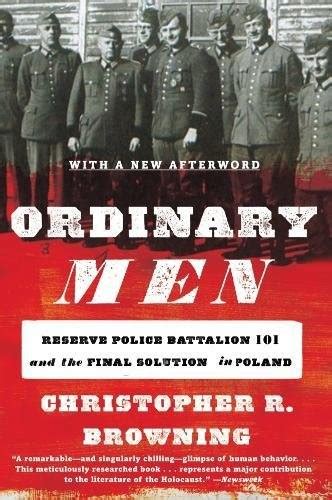|
mental health, book reviews, medical, writer, writing tips, author, author interviews
*Trigger warning* Details regarding the execution of Jews during the Nazi regime.
One of the biggest shames in writing history is the mischaracterization of the mentally ill. I could go into a long rant about this point alone citing all the scenarios and atrocities. I believe there is a central misunderstanding within the population or writers that leads to these mischaracterizations—the myth that one must be mentally ill in order to be evil. Why would someone murder a child? Because they were a sociopath. Why would someone cut up their parents into tiny pieces? Because the voice in their head told them to. This waving of the hand over atrocities and claiming they had to be insane is appalling. Of course, the more uncomfortable fact is most people who commit evil are sane, rational people. This fact should chill us to the bone. Because that means that ‘normal’ people are capable of horrible atrocities. We are capable of incomprehensible evil. I’ve heard it said that one should read history from the eyes of the perpetrator, not the victim to prevent themselves from going down the same road. This is good advice. One of the books that inspired my story Surviving Midas was Ordinary Men: Reserve Police Battalion 101 and the Final Solution by Christopher Browning. It’s a harrowing read and one I had to take breaks from in order to finish. There is very little in terms of records regarding the mental state of the Nazis who executed the Jewish people during the holocaust. During the investigations that followed the war, very few former Nazis would admit to having taken part in any executions. For whatever reason, the men of the Reserve Police Battalion did share their stories. So what sort of men was it that executed millions of Jewish people? For the most part, ordinary men as the title of the book implies. These were farmers, craftsmen, factory workers, with families and children of their own. The Reserve Battalion 101 was given orders to arrive in a town called Jozefow at the break of dawn, haul the Jewish people from their homes, load the men up into trucks for a workcamp, and shoot the women and children. According to certain accounts, these men were shocked and horrified by the orders they were given. Even their commander spent most of the day wringing his hands and muttering about what terrible business they had been wrapped up in. Group after group after group of women and children were taken out to the woods, forced to lay down on their stomachs, and shot in the back of the neck. Many of the officers did not make it through the first couple of executions before asking to be removed from the task. Their requests were granted. They could have gotten out of it from the start, and some of them did. Upon arrival to the Jozefow, their commander informed them any could step out of line and go back to the barracks. Only a couple took him up on that offer. Others would later say they were too stunned in the moment to react with a clear mind, but that wasn’t the only opportunity to bow out. One officer states he stayed up by the trucks for the rest of the day loading the men and being sure to look busy anytime a new group of executioners was being rounded up. So, why did they do it? Per their statements, they feared being considered ‘too weak’ or ‘cowardly.’ They did not want to ‘lose face’ before the other policemen. As one officer stated: “I must answer that no one wants to be thought a coward.” It was one thing to refuse at the beginning, he added, and quite another to try to shoot but not be able to continue. Another stated his reason to not refuse was simply because, “I was a coward.” One policemen, who killed as many as twenty before quitting stated: “I thought that I could master the situation, that without me the Jews were not going to escape anyway . . . Truthfully I must say that at the time we didn’t reflect about it at all. Only years later did any of us become truly conscious of what had happened then . . . Only later did it first occur to me that (it) had not been right.” Others rationalized their actions by believing they were not going to alter the fate of the Jews by saying no anyways. In one bizarre statement, an officer stated he killed only children while his neighbor shot the mothers. His belief was by shooting the mother, the children were dead anyways. I write about this from perspective of an author because I think it’s important for us to be aware of this. Part of the job of an author is to show the truth through lies, and it’s not the truth that most heinous crimes are committed by the insane. It’s misguided, rational people who do the most damage. People who are afraid—in fear for their life, in fear of their livelihood, or just in fear for their reputation—are the most dangerous of us all. Let us strive to know truth and goodness and not be afraid. And let’s tell the truth with our lies (stories) so that others can see it too. Ordinary Men: Reserve Police Battalion 101 and the Final Solution in Poland, by Christopher R. Browning, Harper Perennial, 2017.
0 Comments
Leave a Reply. |
Details
AuthorRW Hague is a registered nurse with over eight years of experience within the medical field. Using her medical expertise, she writes stories that are gritty and compelling. Archives
November 2023
|

 RSS Feed
RSS Feed